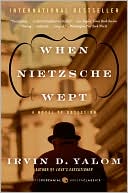When Nietzsche Wept: A Novel of Obsession (Perennial Classics Series)
Search in google:
In nineteenth-century Vienna, a drama of love, fate, and will is played out amid the intellectual ferment that defined the era. Josef Breuer, one of the founding fathers of psychoanalysis, is at the height of his career. Friedrich Nietzsche, Europe's greatest philosopher, is on the brink of suicidal despair, unable to find a cure for the headaches and other ailments that plague him. When he agrees to treat Nietzsche with his experimental "talking cure," Breuer never expects that he too will find solace in their sessions. Only through facing his own inner demons can the gifted healer begin to help his patient. In When Nietzsche Wept, Irvin Yalom blends fact and fiction, atmosphere and suspense, to unfold an unforgettable story about the redemptive power of friendship.Publishers WeeklyThis talky first novel by psychotherapist Yalom ( Love's Executioner ) is set in 1882 Vienna, where Joseph Breuer, an eminent physician and mentor of Sigmund Freud, has applied his recently discovered talking cure to a woman afflicted with multiple symptoms of hysteria. But now it is Breuer who needs help, for he has become obsessed with the beautiful Anna O. although she is no longer his patient. On vacation in Venice, he is asked by Lou Salome, an imperious Russian woman, to treat German philosopher Friedrich Nietzsche, who has threatened suicide because of her rejection. Nietzsche consults Breuer in Vienna and, after a series of subtle subterfuges, agrees to a month of daily meetings; Breuer's plan is to employ the talking cure on the bristling Nietzsche under the guise of getting the philosopher to help him with his own obsession and related depression. In this intelligent, fully imagined tale, Yalom accurately evokes the encapsulated world of Breuer and Nietzsche's sessions as well as the social and intellectual milieu of the period, but the narrative is constrained by too much telling (``Perhaps dreams can express either wishes or fears,'' Freud observes in a discussion with Breuer)--at the expense of showing--and a manipulated, unconvincing resolution. Major ad/promo; author tour. (Aug.)








